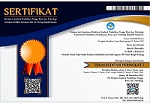Positive Mind dan Efikasi Diri perspektif Al-Qur’an (Studi Tafsir Munasabah Surat Al-Insyirah)
Abstract
Keywords
Full Text:
PDFReferences
Ahmad Mustafa al-Maraghi. Tafsir Al-Maroghi. Juz.2. Beirut: Dar al-Fikr, 1974.
As-Shiddieqy, Teungku Muhammad Hasbi. “Al-Bayan Tafsir Penjelas al-Qur’anul Karim.” Semarang: PT. Pustaka Rizki Putra, 2002.
Astuti, Rini, and William Gunawan. “Sumber-Sumber Efikasi Diri Karier Remaja.” Journal Psikogenesis 4, no. 2 (2017): 141–51. https://doi.org/10.24854/jps.v4i2.348.
Asyur, Muhammad Thohir bin. At-Tahrir Wa at-Tanwir. Juz.30. Tunisia: Dar at-Tunisiah, 1984.
Avin Fadila Helmi, Dkk. “Psikologi Untuk Indonesia: Isu-Isu Terkini Relasi Sosial Dan Intrapersonal Dan Interorganisasi.” Yogyakarta: Gadjah Mada University Press, 2020.
Al-Biqo’i, Ibrahim bin Umar. Nadhmu Ad-Dhurar Fi Tanasubi al-Ayat Wa at-Tanwir. Juz.22. Beirut: Dar al-Kutub al-Ilmiah, 1995.
Dewi, Yolanda Puspita, and Heru Mugiarso. “Hubungan Antara Konsep Diri Dengan Efikasi Diri Dalam Memecahkan Masalah Melalui Konseling Individu Di Smk Hidayah Semarang.” Jurnal Edukasi: Jurnal Bimbingan Konseling 6, no. 1 (2020): 29. https://doi.org/10.22373/je.v6i1.5750.
Fath, Faishol Amir. The Unity of Al-Qur’an. Jakarta: Pustaka Al-Kautsar, 2010.
Hasanah, Nazilatul. “Konsep Self-Efficacy Dalam Al-Qur’an (Studi Penafsiran Ayat-Ayat Self-Efficacy Dalam Tafsir Al-Qur’an).” Islam Negeri Sunan Ampel Surabaya, 2016.
Ika Sandra, Kusnul. “Manajemen Waktu, Efikasi-Diri Dan Prokrastinasi.” Persona:Jurnal Psikologi Indonesia 2, no. 3 (2013): 217–22. https://doi.org/10.30996/persona.v2i3.140.
Indah Komsiyah. “Belajar Dan Pembelajaran.” Yogyakarta: Teras, 2012.
M. Quraish Shihab. “Tafsir Al-Misbah,” Volume: 6. Jakarta: Lentera Hati, 2002.
Al-Mab’as, Muhammad. Manhajul Bahtsi Al-Washfi al-Watsaiqi. Riyadh: Universitas Imam Muhammad bin Su’ud al-islami, 2022.
Mardalis. Metode Penelitian Suatu Pendekatan. Cet. ke-3. Jakarta: Bumi Aksara, 1995.
Nurihsan, Syamsu Yusuf dan A. Juntika. “Teori Kepribadian.” Bandung: Remaja Rosdakarya, 2013.
Puri, Lintang Waskita, and Budi Astuti. “Profil Efikasi Diri Siswa MAN Wonokromo Bantul.” Counsellia: Jurnal Bimbingan Dan Konseling 8, no. 2 (2018): 135. https://doi.org/10.25273/counsellia.v8i2.3243.
Al-Qattan, Manna. Mabahis Fi ’Ulumil Qur’an. Darul Ilmu wal Iman, n.d.
———. Studi Ilmu Al-Qur’an. Jakarta: Litera AntarNusa, 2001.
Rifaannudin, Mahmud, and Abdul Aziz. “Kajian Bahasa Al-Qur’an Antara Lafadz As-Sakinah Dan At-Tuma’ninah: (Kajian Semantik Qur’an).” Al Muhafidz: Jurnal Ilmu Al-Qur’an Dan Tafsir 3, no. 1 (June 4, 2023). https://doi.org/10.57163/almuhafidz.v3i1.53.
Rifaannudin, Mahmud, and Arina Sabilahaq. “Mafhūmu kalimātu ‘Qawlan Ma’rūfan dan Qawlan Sadīdan’ fi Sūrati An-Nisā’ (Dirosah Ad-dalālah Al-qur’āniyah).” Jurnal Ulunnuha 10, no. 2 (December 31, 2021): 155–72. https://doi.org/10.15548/ju.v10i2.1965.
Risnawati, M. Nur Gufron dan Rini. “Teori-Teori Psikologi.” Yogyakarta: Ar-Ruzz Media, 2016.
Shodiq, Abu Thayyib Muhammad. Fathu Al-Bayan Fi Maqashidi al-Qur’an. Juz.15. Beirut: al-Maktabah al-’Ishriyyah, 1412.
As-Suyuti, Jalal al-Din Abd Rahman Abi Bakar. Al-Itqan Fi Ulum al-Qur’an. Lebanon: Dar al-Kutub al-Islamiyah, 1971.
Westi, Nelfi. “Munāsabah Dalam Sūrah Al - Jumu ’ Ah ( Kajian Munāsabah Pada Tafsir Al- Asās Karya Saʻīd Hawwā ).” UIN Syarif Hidayatullah, 2017.
Yunus, Mahmud. Kamus Arab-Indonesia. Jakarta: Mahmud Yunus wa Dzurriyyah, 2009.
Yusman, Helrahmi. “Kesatuan Tema Surat Al-Qur’an: Analisis Terhadap Konsep Mihwar Dalam Tafsir Fi Zhilalil Qur’an.” Tangerang Selatan: Young Progressive Muslim, 2016.
Zagoto, Sri Florina Laurence. “Efikasi Diri Dalam Proses Pembelajaran.” Jurnal Review Pendidikan Dan Pengajaran 2, no. 2 (2019): 386–91. https://doi.org/10.31004/jrpp.v2i2.667.
Az-Zarkasyi, Badr ad-Din Muhammad bin Abdullah. Al-Burhan Fi ’Ulumu al-Qur’an. Kairo: Maktabah Dar at-Turats, n.d.
Zubaidi, Sujiat. ‘Ilm Dalalah Qur’Aniyah Manhajiyah al-Tahlily Dalaly Fi Alfadz al-Qur’an. Cairo: Dar Ghareb, 2018.
Az-Zuhaili, Wahbah. Tafsir Al-Munir Fi al-Aqidah Wa al-Syari’ah Wa al-Manhaj. Cet. ke-2. Damaskus: Dar al-Fikr, 1418.
Refbacks
- There are currently no refbacks.

This work is licensed under a Creative Commons Attribution-NonCommercial-ShareAlike 4.0 International License.
Prodi Ilmu Al-Qur`an dan Tafsir, Fakultas Ushuluddin Dan Studi Agama, UIN Imam Bonjol Padang
Jl. Sungai Bangek, Kel. Balai Gadang, Kec. Koto Tangah.
Kota Padang, Sumatera Barat, 25171
E-mail: jurnal-ulunnuha@uinib.ac.id

This work is licensed under a Creative Commons Attribution-ShareAlike 4.0 International License.





1.jpg)
.jpg)